Legendary Kathak dancer Birju Maharaj passes away
| Date :18-Jan-2022 |

NEW DELHI :
KATHAK doyen Birju Maharaj, who took the classical Indian dance form to the world and helped make it accessible for generations of students and audiences, died at his home here in the early hours of Monday. He would have been 84 next month. Maharaj-ji, as he was popularly known, died surrounded by his family and disciples, laughing and smiling till the very end. They were playing ‘antakshari’ after dinner when he suddenly took ill, his granddaughter Ragini Maharaj told PTI. Birju Maharaj, one of India’s best known artistes who was also a thumri exponent and even voiced a song for Satyajit Ray’s “Shatranj Ke Khiladi”, was from Lucknow’s Kalka-Bindadin Gharana. He is survived by five children, three daughters and two sons, and five grandchildren. He had been suffering from a kidney ailment and was under dialysis treatment for the last month due to high diabetes. He probably died of a cardiac arrest, his granddaughter said. “He was with us when this happened. He had his dinner and we were playing ‘antakshari’ because he loved old music. He was lying down… and suddenly his breathing became uneven. We think it was a cardiac arrest as he was also a heart patient. “This happened between 12.15 and 12.30 am. It must have been just a minute or so. We rushed to the hospital but unfortunately, we could not save him.
He died before reaching the hospital,” Ragini said. Ragini, a Kathak dancer herself, said the only solace for the family is that he did not suffer too much. “Two of his disciples and his two granddaughters, my younger sister Yasyashashwini and me, were with him when this happened. He was laughing, smiling in his last moments,” she said. Condolences poured in as news came in of the death of the Kathak maestro, who would have been 84 on February 4. In his last interview with PTI in December, Birju Maharaj had said the future of Kathak was bright in India with the new generation taking the tradition forward. “Artistes who passionately work towards carrying the tradition forward are the right torchbearers of an art form and its legacy. It takes a lot of work and dedication to stay true to a mighty tradition such as classical dance,” the Padma Vibhushan awardee had said. Brajmohan Maharaj or Birju Maharaj was a descendant of the Maharaj family of Kathak dancers.
He trained under his father and guru Acchan Maharaj and uncles Shambhu Maharaj and Lachhu Maharaj. Singer Durga Jasraj, daughter of the late Pandit Jasraj, called Birju Maharaj’s death “a monumental loss to Indian performing arts”. “Legendary Pt Birju Maharaj ji’s departure has left us poorer, shattered. Pray Maharaj ji’s soul rests in rhythmic peace. Deepest condolences to his family, disciples and fans across the world. Om Shanti,” she wrote on Twitter. Dancer Geeta Chandran also mourned Birju Maharaj’s death and described his contribution to the world of dance as historic and one that will be carried forward by his absolutely amazing tribe of disciples and students. “Loss yes. But also hope in the fact that he has lit many lamps that will continue to spread the light,” she said in a statement. Birju Maharaj, whose joie de vivre cut through the aura of fame and legend to make him an instant favourite, was also was much admired in the film industry with directors and actors turning to the Kathak exponent for their performances. His talent was first sought by the great Satyajit Ray for his only Hindi film “Shatranj Ke Khiladi” in 1977. While a disciple performed the dance, Birju Maharaj, also a talented vocalist, sang “Kanha main tose haari”.
The song has its own history. It was written by Bindadin Maharaj, Birju Maharaj’s grandfather Kalka Prasad’s brother, who was a dancer in the court of Nawab Wajid Ali Shah. The two brothers went on to establish the Kakla-Bindadin Lucknow Gharana later with Birju Maharaj taking it to new heights in his lifetime. Ranked among India’s best classical dancers ever, he received several awards in his career, including the Padma Vibhushan, Sangeet Natak Akedami Award, Kalidas Samman, a National award as the best choreographer in “Vishwaroopam” and a Filmfare award for “Bajirao Mastani”.
